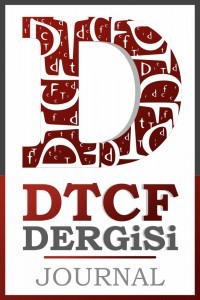MACAR DİLİNDE EDİMBİLİM ARAŞTIRMALARI VE YABANCI DİL OLARAK MACARCA ÖĞRETİMİNDE ÖNEMİ
Edimbilim, Macar Dili, Söz Edimi Teorisi, Edimsöz Edimi, Özür Dileme, Yabancı Dil Eğitimi, Görgü Kuralları, Edimsöz Gücünü İçeren Araç
Pragmatic Researches on Hungarian Language and Their Importance in Teaching Hungarian as a Foreign Language
Pragmatics, Hungarian, Speech Act Theory, Illocutionary Act, Asking for Pardon, Foreign Language Teacheing, Politeness, Illocutionary Force Indicating Device,
___
- AUSTIN, J. L. (1990). Tetten ért szavak. (Çev. Pléh, Csaba). Budapest: Akadémiai Kiadó
- BEEBE, L. - TAKAHASHI, T. - ULISS-WELTZ, R. (1990). “Pragmatic Transfer in ESL Refusals”. Developing Communicative Competence in a Second Language. (Haz. Scarella, R. - Andersen, E. - Krashen, S.). New York: Newbery House. 55-73.
- BLUM-KULKA, S. - HOUSE, J. (1989). Cross-cultural and Situational Variation in Requesting Behavior. Cross-cultural Pragmatics: Request and Apologies. Norwood: Ablex Publishing Corporation. 123-153.
- BLUM-KULKA, S. - HOUSE, J. - KASPER, G. (Haz.). (1989). Cross- cultural Pragmatics: Request and Apologies. Norwood: Ablex Publishing Corporation.
- BROWN, P. – FRASER, C. (1979). Speech as a Marker of Situation. Social Markers in Speech. (Haz. Scherer, K. - Giles, H.). Cambridge: Cambridge University Press. 33-63.
- BROWN, P. - LEVINSON, S. (1990). “Univerzáliák a nyelvhasználatban: az udvariasság jelenségei”. A szóbeli befolyásolás alapjai. I-II. Budapest: Tankönyvkiadó.
- GRICE, H. P. (1997). “Jelentés”. (Çev. Terestyéni, Tamás). Nyelv, kommunikáció, cselekvés. (Haz. Pléh, Csaba - Terestyéni, Tamás). Budapest: Osiris. 188-197.
- GRICE, H. P. (1997). “A társalgás logikája”. (Çev. Pléh, Csaba). Nyelv, kommunikáció, cselekvés. (Haz. Pléh, Csaba - Terestyéni, Tamás). Budapest: Osiris. 213-228.
- HOLMES, J. (1988). “Compliments and Compliment Responses In New Zealand English”. Anthropological Linguistics 28, 485-508.
- HYMES, D. (1975). “A beszélés néprajza”. Társadalom és nyelv. Szociolingvisztikai írások. (Haz. Szépe, György-Mária, Pap). Budapest: Gondolat, 91-145.
- HYMES, D. (1978). “Kommunikatív kompetencia”. Kommunikáció. 2. (Haz. Horányi, Özséb). Budapest: Közgazdasági és Jogi Könyvkiadó, 333-356.
- LABOV, W. (1979). “A nyelv vizsgálata társadalmi összefüggésben”. Beszédaktus - kommunikáció - interakció. (Haz. Pléh, Csaba - Terestyéni, Tamás). Budapest: Tömegkommunikációs Kutatóközpont. 365-398.
- LABOV, W. - FANSHEL, D. (1997). “Beszélgetési szabályok”. (Çev. Síklaki, István). Nyelv, kommunikáció, cselekvés. (Haz. Pléh, Csaba - Terestyéni, Tamás). Budapest: Osiris. 395-435.
- LEVINSON, S. C. (1997). “Az előfeltevések”. (Çev. Pléh, Csaba). Nyelv, kommunikáció, cselekvés. (Haz. Pléh, Csaba -Terestyéni, Tamás). Budapest: Osiris. 341-379.
- OLSHTAIN, E. - COHEN, A. D. (1983). “Apology: A Speech Act Set.” Sociolingistics and Language Acquisition. (Haz. Wolfson, N. – Judd, E.). Rowley, MA: Newbury House. 18-35.
- OLSHTAIN, E. (1989). “Apologies Across Languages”. Cross-cultural Pragmatics: Request and Apologies. Norwood: Ablex Publishing Corporation. 155-173.
- PLÉH, Csaba - TERESTYÉNI, Tamás (Haz.). (1997). Nyelv, kommunikáció, cselekvés. Budapest: Osiris.
- RICHMOND, Y. (1995). From Da to Yes. Intercultural Press.
- SEARLE, J. R. (1997). “Az illokşciós aktusok szerkezete” (Çev. Haberman, Gusztáv). Nyelv, kommunikáció, cselekvés. (Haz. Pléh, Csaba - Terestyéni, Tamás). Budapest: Osiris. 43-61.
- SEARLE, J. R. (1997). “Közvetett beszédaktusok” (Çev. Síklaki, István). Nyelv, kommunikáció, cselekvés. (Haz. Pléh, Csaba - Terestyéni, Tamás). Budapest: Osiris. 62-81.
- SZILI, Katalin. (2000). “Az udvariasság elméletéről, megjelenési módjairól a magyar nyelvben”. Hungarológia 2. Budapest: Nemzetközi Hungarológiai Központ, 261-282.
- SZILI, Katalin. (2002a). “A kérés pragmatikája a magyar nyelvben”. Magyar Nyelvőr 1. 12-29.
- SZILI, Katalin. (2002b) “Hogyan is mondunk nemet magyarul?” Magyar Nyelvőr 3. 204-219.
- SZILI, Katalin. (2003) “Elnézést, bocsánat, bocs…” Magyar Nyelvőr 3. 292- 307.
- SZILI, Katalin. (2004). Tetté vált szavak. Budapest: Tinta Könyvkiadó.
- THOMAS, J. (1983). Cross-cultural Pragmatic Failure. Applied Linguistics 4, 91-112.
- VOLLMER, H. J. - OLSHTAIN, E. (1989). “The Language of Apologies in German.” Cross-cultural Pragmatics: Request and Apologies. Norwood: Ablex Publishing Corporation. 197-218.
- Yayın Aralığı: Yılda 2 Sayı
- Başlangıç: 1942
- Yayıncı: Ankara Üniversitesi
Henryk Sienkiewicz’in Romanlarında Yurt ve Yurtseverlik İzleği
FANTASTİK EDEBİYATA GENEL BİR BAKIŞ - STEFANO BENNI VE STRANALANDIA
Rönesans ve Barok Döneminde Macar Okul Dramaları
Michel Butor’un "Dereceler" Adlı Romanında Anlatımsal Yapı ve Anlatım Yöntemleri
Polonyalı Yazar Stefan Żeromski’nin "Erken Bahar" Başlıklı Romanı Üzerine Bir İnceleme
Viktor Grigoroviç’in İstanbul ve Balkan Yarımadasını Kapsayan Gezisi
Küresel Isınma, Nedenleri ve Sonuçları
Baranyai Decsi János’un "Türk İmparatorlarının Kroniği" İsimli Manzum Tarihi
